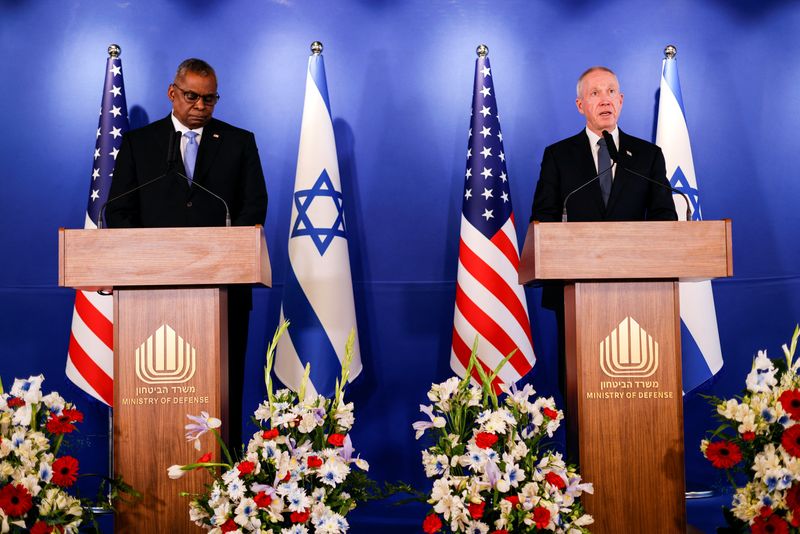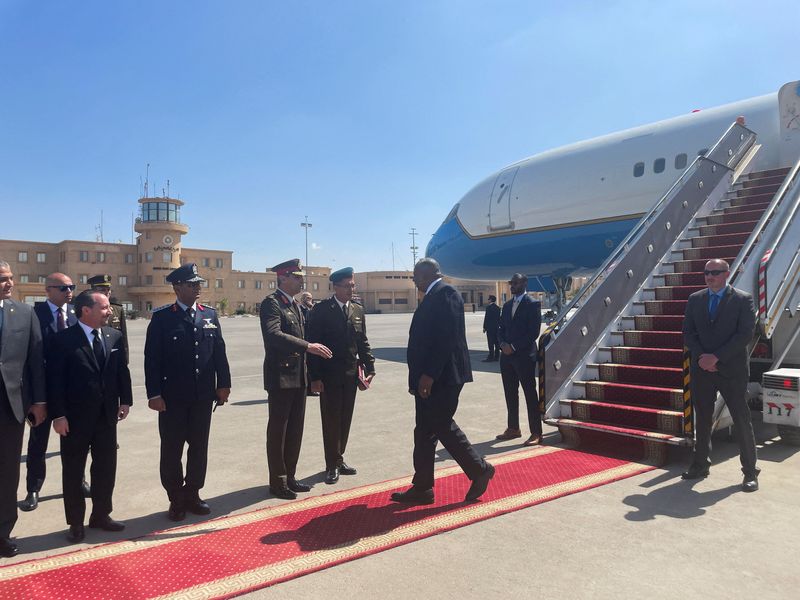By Idrees Ali
BEN GURION AIRPORT, Israel (Reuters) -Pentagon chief Lloyd Austin told Israeli leaders on Thursday to take steps to reduce tensions in the occupied West Bank, amid growing worry in Washington that the situation could distract the allies from their effort to counter Iran.
Austin, who is on a regional tour, landed in Ben Gurion Airport for a visit that had been hastily rescheduled due to a surge in street protests against Israeli Prime Minister Benjamin Netanyahu's plan to overhaul the judiciary.
Hours earlier, Israeli forces killed three Islamic Jihad gunmen in the West Bank, among territories that have seen simmering violence amid the Palestinians' long-stalled goal of statehood.
"The United States (remains) firmly opposed to any acts that could trigger more insecurity, including settlement expansion and inflammatory rhetoric," Austin told reporters after his meeting with Israeli Defence Minister Yoav Gallant.
"We're especially disturbed by violence by settlers against Palestinians," Austin said, adding that his discussions were frank and candid.
He met Netanyahu earlier at the airport for more than an hour and a Pentagon readout of the meeting said Austin called for "immediate steps to de-escalate violence and work towards a just and lasting peace".
The U.S. is Israel's closest ally and both countries are increasingly concerned about Iranian military activities in the region and its nuclear programme - which Tehran says is wholly focused on power generation and other peaceful projects.
Austin's discussions with Gallant focused in part on Iran, but the increasing violence in the West Bank cast a long shadow over the meeting.
Gallant reiterated Israel's long-standing position that Iran must not be permitted to obtain nuclear weapons and Israel had to "be prepared for every course of action".
But a senior U.S. defence official, speaking on condition of anonymity because of the sensitivity of the issue, said Israel's preoccupation with the West Bank "detracts from our ability to focus on what the strategic threat is right now and that is Iran's dangerous nuclear advances and continuing regional and global aggression."
Austin had originally been due to arrive on Wednesday and stay overnight in Tel Aviv, where Israel's Defence Ministry is based. But those plans were changed due to concern about traffic disruptions from the anti-Netanyahu protests.
"Austin is committed to Israel's security, but one of the dominant ways in which we've been able to work together and strengthen that relationship is because we're two democracies that share values," the U.S. official said, adding that those values included the right to protest.
FLASHPOINTS
Among West Bank flashpoints concerning the United States is the village of Huwara, where the Feb. 26 killing by a Palestinian gunman of two brothers from a Jewish settlement triggered revenge riots by settlers.
The rampage triggered worldwide condemnation, which increased when ultra-nationalist Finance Minister Bezalel Smotrich, who has responsibility for aspects of the West Bank administration, said Huwara should be "erased".
Smotrich later offered a partial retraction.
There has been no sign of any let-up in the violence ahead of the start of the Muslim holy month of Ramadan and the Jewish Passover festival.
Since the beginning of the year, Israeli forces have killed more than 70 Palestinians, including militant fighters and civilians; in the same period, Palestinians have killed 13 Israelis and one Ukrainian woman in apparently uncoordinated attacks.

The judicial overhaul proposed by Netanyahu would give his nationalist-religious coalition decisive sway in picking judges and limit the scope of the Supreme Court to strike down legislation or rule against the executive.
Dozens of Israeli air force reservists said on Sunday they would not turn up for training in protest against Netanyahu's judicial reforms, a jolt for a country whose melting-pot military is meant to be apolitical.
